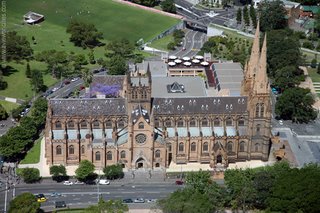 This is the seventh in a series by F W Boreham from his essay The Long Arm of Coin-cidence, soon to be included in the forth-coming book, The Best Essays of F W Boreham.
This is the seventh in a series by F W Boreham from his essay The Long Arm of Coin-cidence, soon to be included in the forth-coming book, The Best Essays of F W Boreham.After describing several coincidences and offering some reflections F W Boreham describes another amazing coincidence:
Only last night I came upon a set of circumstances so arresting and so intriguing that, for the life of me, I cannot with confidence declare that they do, or do not, represent anything more than a very remarkable coincidence.
I number among my friends two young ladies—Beryl Hamilton and Lucy Minogue—who, as partners, control one of those attractive businesses whose windows and counters are tastefully adorned with high-class bric-á-brac—artistic pottery, pretty paintings, dainty calendars, busts, plaques, statuettes, and the like. Beryl is a Protestant, Lucy a Catholic. Both are transparently sincere, and each is the soul of courtesy and consideration in her attitude towards the faith of the other.
Some time ago, Lucy's mother, a widow, to whom she was passionately devoted, suddenly died. The cruel shock and the desolating loss shattered the daughter's nerve. Night and day, she could think of nothing but her dead mother. Where was she? Would they ever meet again and be to each other what they had been in the old days? And, above all, was her mother happy? The sacraments of her Church comforted her, but they gave her no solid satisfaction on this point. Was her mother happy? How could she ascertain? The terrible uncertainty, preying constantly upon her mind, affected her health; and Beryl, her partner, urged her to take a good rest with an entire change of scene.
`Why not go to Sydney?' Beryl pleaded. `A quiet spot in the country or beside the sea might give you too much time to brood. But Sydney is a lovely place for a holiday. You will have the city to distract your thoughts when you desire that kind of relaxation, and, whenever you feel inclined for the beach or the bush, you can find a new excursion every day. It will do you heaps of good. And I'll be quite all right here. It's the slack season, and either of us could easily be spared.'
Infected by Beryl's enthusiasm, Lucy agreed to do so. And it was during that visit to Sydney that she encountered the experience of which I am about to tell.
She thoroughly enjoyed her stay and was particularly appreciative of the good sense displayed by her partner in suggesting the venue of her holiday. Beneath all her pleasure, however, she was subconsciously aware of the old deep undertone of terrible loneliness and insatiable longing. If only she knew—knew for certain—that all was well with her mother! Impelled by some such mood, she one afternoon turned from the bustle of the city to rest quietly for a while amidst the green lawns and gushing fountains and colourful flower-beds of Hyde Park. Seated there, her eye carne to rest on the graceful turrets and Gothic stateliness of St. Mary's Cathedral. As though magnetized by its solemn splendour, she rose and turned her footsteps towards it.
In wandering aimlessly but meditatively about the Cathedral, she felt herself drawn—she scarcely knew why—towards a small statue of Santa Teresa. It instantly brought to mind the lovely stories that her mother had told her. Her mother always spoke of Santa Teresa as the most human, the most understanding, the most womanly of saints—a saint who radiated sympathy and courage and common sense. She used to tell Lucy of Teresa's fondness, as an old woman, for the young nuns under her charge and of her anxiety that they should all be perfectly happy. Lucy had never before seen a representation of Santa Teresa; but now that she looked into her sculptured face, she felt that there was something singularly winsome and kindly in her countenance. Teresa was represented, in the statue, as carrying a cross and an armful of roses. Why the flowers? Lucy wondered.
(Story to be continued)
Source: F W Boreham, ‘The Long Arm of Coincidence’, I Forgot to Say (London: The Epworth Press, 1939), 87-96.
Image: St. Mary's Cathedral, Sydney


